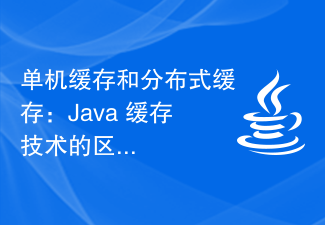Java caching technology is one of the optimization techniques commonly used by developers to improve application performance. However, there are some cache space limitations in caching technology. When the limit is exceeded, application performance may decrease or crash. This article will introduce cache space limitations in Java caching technology and provide some solutions.
What is the cache space limit?
The cache space limit refers to the limit on the number of objects that the cache can cache or the size of the cache. In Java caching technology, the cache is usually implemented by java.util.Map, where keys and values are the keys and values of the objects to be cached respectively. Limitations in caching technology are usually divided into the following two types:
- Limit on the number of cached objects
The limit on the number of cached objects refers to the number of objects that the cache can cache limit. This limitation is usually used for in-memory caches. Due to the limitations of Java memory, the number of objects that the cache can cache is limited. Once the limit is exceeded, it may cause application performance degradation or crash.
- Cache size limit
The cache size limit refers to the limit on the size of objects that the cache can cache. This limitation is usually used for hard disk caches. Due to the limited space of the hard disk, the size of the objects that the cache can cache is also limited. Once the limit is exceeded, the cache may delete some cached objects to make more space.
How to solve the problem of cache space limitation?
In Java cache technology, there are mainly the following methods to solve the problem of cache space limitation:
- Expired cache strategy
Expired cache strategy refers to After the cache time expires, it is deleted from the cache. This strategy can reduce cache space pressure while also ensuring cache freshness. In Java, you can implement expiration caching strategies using the Timer and TimerTask classes.
- Elimination cache strategy
The elimination cache strategy refers to deleting some cached objects to make more space when the cache space is insufficient. Common obsolescence strategies include LRU (least recently used) and LFU (least recently used). In Java, you can use the LinkedHashMap class to implement the LRU strategy and the TreeMap class to implement the LFU strategy.
- Distributed cache technology
Distributed cache technology refers to distributing caches on multiple nodes to increase cache space. Commonly used distributed caching technologies include Memcached and Redis. In Java, you can use Spring Cache technology to implement distributed caching.
- Compress cache objects
Compressing cache objects can reduce the cache space occupied and also improve the reading and writing speed. Commonly used compression algorithms include Gzip and Snappy. In Java, you can use the Gzip class library provided by Java and the third-party Snappy class library to implement compressed cache objects.
Summary
This article introduces the cache space limitations and solutions in Java cache technology. When developers use caching technology, they need to consider the limitations of the cache space to avoid performance problems caused by exceeding the limit. At the same time, depending on different usage scenarios, choosing appropriate caching strategies and methods can optimize application performance.
The above is the detailed content of Cache space limitations in Java caching technology. For more information, please follow other related articles on the PHP Chinese website!
 缓存预热:Java 缓存技术中如何提高应用性能Jun 21, 2023 am 11:25 AM
缓存预热:Java 缓存技术中如何提高应用性能Jun 21, 2023 am 11:25 AM随着互联网技术的不断发展,大量的用户和海量的数据访问已经成为普遍现象,在这种情况下,Java缓存技术作为一种重要的解决方案应运而生。Java缓存技术可以帮助提高应用程序的性能,减少对底层数据库的访问,缩短用户等待时间,从而提高用户体验。本文将讨论如何使用缓存预热技术进一步提高Java缓存的性能。什么是Java缓存?在软件应用中,缓存是一种常见的技
 Java 缓存技术中的二级缓存Jun 20, 2023 pm 12:51 PM
Java 缓存技术中的二级缓存Jun 20, 2023 pm 12:51 PM随着互联网的普及和信息化进程的加速,数据量呈现爆发式增长,使得我们在开发过程中遇到的问题也愈发复杂。而缓存技术的出现则成为了一种非常好的解决方案,它们能够提升系统的性能和可靠性。在这些技术中,二级缓存直接参与到应用程序中来,为我们提供了很多实用价值。本文将介绍Java缓存技术中的二级缓存。一.什么是缓存技术?缓存技术是计算机领域中常用的一种性能优化方法,
 针对大文件缓存的 Java 缓存技术Jun 21, 2023 pm 04:12 PM
针对大文件缓存的 Java 缓存技术Jun 21, 2023 pm 04:12 PM随着数据量和访问量的不断增加,如何提高数据访问的效率成为了每个开发者不断探索的领域之一。针对大文件缓存的Java缓存技术,是其中一个重要且实用的技术。一、为什么需要针对大文件的缓存在实际开发中,我们经常会遇到需要读取和处理大文件的情况。例如,一个10GB的文件需要解析分析,如果每次处理都需要重新读取整个文件,将会耗费大量的存储和时间。这时可以考虑使用缓存
 Java 缓存技术中的缓存空间限制Jun 19, 2023 pm 11:19 PM
Java 缓存技术中的缓存空间限制Jun 19, 2023 pm 11:19 PMJava缓存技术是开发者常用的优化技术之一,用于提升应用程序性能。然而,缓存技术中存在一些缓存空间限制的问题,当超出限制时,可能会引起应用程序性能的下降或者崩溃。本文将介绍Java缓存技术中的缓存空间限制,并提供一些解决方案。缓存空间限制是什么?缓存空间限制指的是缓存器所能缓存的对象数量或缓存大小的限制。在Java缓存技术中,缓存器通常是由jav
 Java 缓存技术中的缓存重建机制Jun 20, 2023 am 08:30 AM
Java 缓存技术中的缓存重建机制Jun 20, 2023 am 08:30 AM在开发高性能应用程序中,缓存技术是不可或缺的一环。在Java开发中,缓存技术也很常见,但是在缓存使用过程中会遇到一个非常重要的问题,即缓存数据的更新和重建。本文将介绍Java缓存技术中的缓存重建机制,帮助读者更好地理解和使用缓存技术。一、缓存重建机制的概念和作用缓存重建机制指的是在缓存系统中,当缓存数据发生变化或者过期时,如何及时更新缓存数据,以保证数据的准
 Java 缓存技术中的缓存标识符Jun 20, 2023 pm 02:16 PM
Java 缓存技术中的缓存标识符Jun 20, 2023 pm 02:16 PM随着互联网应用的发展,数据量越来越大,访问速度也变得越来越重要。在软件开发中,缓存技术成为提高应用性能的一种重要手段。Java缓存技术包括了多种缓存实现方式,在使用缓存技术时,缓存标识符也是一个需要注意的问题。本文将介绍Java缓存技术中的缓存标识符,对缓存标识符的概念、作用及常用实现方式进行深入探讨。一、缓存标识符概念缓存标识符是指被缓存对象的唯一标
 单机缓存和分布式缓存:Java 缓存技术的区别与应用Jun 19, 2023 pm 10:06 PM
单机缓存和分布式缓存:Java 缓存技术的区别与应用Jun 19, 2023 pm 10:06 PMJava缓存技术广泛应用于提高应用程序的性能和效率,其中单机缓存和分布式缓存是两种常见的缓存技术。本文将介绍单机缓存和分布式缓存的区别,以及它们在Java缓存技术中的应用。一、单机缓存单机缓存是指将缓存存储在应用程序所在的单台计算机中。常用的单机缓存技术包括Ehcache、GuavaCache和Caffeine等。Ehcache是一个流行的
 Java 缓存技术中的缓存热备份Jun 20, 2023 am 09:44 AM
Java 缓存技术中的缓存热备份Jun 20, 2023 am 09:44 AM在软件开发中,缓存技术是提高系统性能和响应速度的重要手段。在Java缓存技术中,热备份是一项非常重要的技术,可以在缓存数据失效时快速恢复缓存数据,提高系统的可用性和可靠性。什么是缓存热备份?在Java缓存技术中,缓存热备份是指在缓存数据失效时,自动从备份数据中加载数据并更新缓存中的数据。这样可以避免因缓存数据失效而对存储系统造成较大的压力,提高系统的


Hot AI Tools

Undresser.AI Undress
AI-powered app for creating realistic nude photos

AI Clothes Remover
Online AI tool for removing clothes from photos.

Undress AI Tool
Undress images for free

Clothoff.io
AI clothes remover

AI Hentai Generator
Generate AI Hentai for free.

Hot Article

Hot Tools

EditPlus Chinese cracked version
Small size, syntax highlighting, does not support code prompt function

ZendStudio 13.5.1 Mac
Powerful PHP integrated development environment

VSCode Windows 64-bit Download
A free and powerful IDE editor launched by Microsoft

SublimeText3 Mac version
God-level code editing software (SublimeText3)

Dreamweaver Mac version
Visual web development tools





